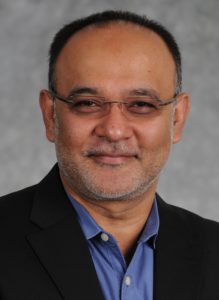Irfan Essa is a Distinguished Professor in the School of Interactive Computing (IC) and a Senior Associate Dean in the College of Computing (CoC) at the Georgia Institute of Technology (GA Tech) in Atlanta, Georgia, USA. He is serving as the Inaugural Executive Director of the new Interdisciplinary Research Center for Machine Learning at Georgia Tech (ML@GT). He is also an Adjunct Professor in the School of Electrical and Computer Engineering. He also holds the position of Senior Staff Research Scientist at Google Inc. (Google Research) in Mountain View, CA. USA.
Irfan Essa works in the areas of Computer Vision, Machine Learning, Computer Graphics, Computational Perception, Robotics, Computer Animation, and Social Computing, with potential impact on Autonomous Systems, Video Analysis, and Production (e.g., Computational Photography & Video, Image-based Modeling and Rendering, etc.) Human-Computer Interaction, Artificial Intelligence, and Computational Journalism research. His specific research interests are in Video Analysis & Synthesis, and Activity & Behavior Recognition. He also a founder of the new topic of Computational Journalism. Specifically, he is interested in the analysis, interpretation, authoring, and synthesis (of video), with the goals of building aware environments & supporting healthy living, recognizing & modeling human behaviors, empowering humans to effectively interact with each other, with media & with technologies, and developing dynamic & generative representations of time-varying streams. He has published over 200 scholarly articles in leading journals and conference venues on these topics and several of his papers have also won best paper awards.
He teaches classes in the areas of Computer Vision, Computational Photography, Computational Perception, Computer Animation, Digital Video Special Effects, Computational Journalism, and Computing, Society, Professionalism & Ethics. He also teaches online courses on Computational Photography and Computer Vision as part of the Online MS CS program at GA Tech.
At GA Tech, he is primarily affiliated with two interdisciplinary research centers; the Machine Learning at GA Tech (ML@GT) Center, which he directs, and the GVU Center. He is also affiliated with several GA Tech Interdisciplinary Research Institutes, namely, IRIM, IPaT, IDEaS and IISP.
He founded the Computational Perception Laboratory (CPL) at GA Tech in 1996, which he now co-directs with 4 other faculty members. He is also the founding member of the Aware Home Research Initiative (AHRI). He also leads efforts on Digital Video Special Effects & Animation (DVFX) and Computational Photography. In 2008, he launched a new area of Computational Journalism (CnJ) aimed at understanding technologies that impact how citizens interact with information (also referred to as Civic Computing). He is also affiliated with the new Center for Computational Behavior Science. He helped establish a new BS in Computational Media (CM) Degree at GA Tech and is affiliated with the new Ph.D. program in Human-Centered Computing (HCC) and with Initiatives in Robotics at GA Tech, including a Ph.D. in Robotics. He also co-created the Ph.D. in Machine Learning degree.
He has been awarded the NSF CAREER Award and within GA Tech, he has won the College of Computing’s Junior and Senior Research Faculty Awards, Outstanding Teacher Award, Outstanding Mentor Award, Institute’s Educational Innovation Award, and the Dean’s Award. He is also a recipient of the GVU Center’s 15 years of Impact Award. He was elected to the grade of IEEE Fellow in 2011. He has also earned several best paper awards.
For the Academic Year 2008-2009, Irfan Essa was also affiliated with the newly formed Disney Research Lab in Pittsburgh, PA as a Visiting Scientist/Consultant (a role he continued in 2009-2011). During that time, he was also an Adjunct Faculty Member at Carnegie Mellon’s Robotics Institute. Since 2011, he has been working with Google Research as a Researcher/Consultant.
He joined GA Tech Faculty in 1996 after his earning his MS (1990), Ph.D. (1994), and holding a Research Faculty position at the Massachusetts Institute of Technology (Media Lab) [1988-1996]. His Doctoral research was in the area of Facial Recognition, Analysis, and Synthesis.
